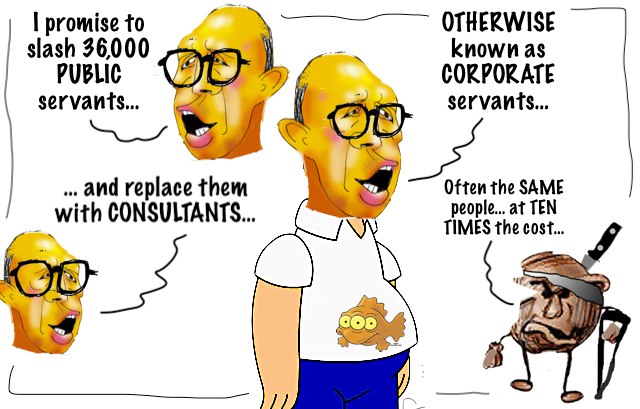Search
Democracy Links
Member's Off-site Blogs
drop the sub. save money.....

Would be prime minister Peter Dutton has vowed to slash 36,000 public service jobs but will bringing back consultants be efficient? Josh Barnett checks the evidence.
Channelling the politics of Donald Trump, would be PM Peter Dutton has declared war on the public service pledging to axe the 36,000 public sector jobs added since Labor came to power under Anthony Albanese.
Peter Dutton’s DOGE: draining the swamp or making the swamp great again?
The details of the Coalition plan are foggy. And putting aside the irony that Dutton’s war on waste is to be accompanied by a $330B public spend on his nuclear energy proposal – that’s on the Coalition numbers which energy experts say have been severely lowballed – there is the issue of whether outsourcing government to consultants is actually efficient.
“Economic surgery to stop wasteful spending must start,” Peter Dutton has said. Yet Barbara Pocock, one of the senators who presided over the PwC inquiry into consultants says, “Look what happened last time they did this. They spent $20 billion on outsourcing to the private sector to do the same work at twice the cost.
A review of the NSW Government’s reliance on consultants under the previous Coalition administration highlights the issue.
Twice the priceBetween 2017-18 and 2021-22, the state engaged over 10,000 consultants, averaging one new consultant contract per working hour for five years. The average contract price increased by 58.6%, from $75,180 to $119,246, with $196.7 million spent on generalist work that could have been done in-house (NSW Government).
The financial inefficiency of outsourcing is further demonstrated when comparing costs directly. Check this out. A 30-day project handled by an external consultant cost the government $309,000, whereas using an in-house team for the same work would have cost $147,450, a 52% saving (NSW Government).
At the federal level, the trend is even more pronounced. An audit of Morrison government spending in its final year revealed $20.8 billion was spent on consultants and outsourcing, with outsourced service providers accounting for nearly 70% of public sector expenditure.
The Big FourThis raises significant concerns about whether these contracts represent good value for taxpayers, particularly when major consultancy firms like PwC, KPMG, Deloitte, and EY have been implicated in conflicts of interest and double-dipping on government contracts.
The broader implication is that public sector job cuts do not necessarily reduce costs but instead shift public funds into private hands at a premium.
While some outsourcing is necessary for specialist expertise, the scale and cost of consultant dependency in Australia’s public sector suggest that efficiency is not the primary driver behind these decisions.
Instead, the data indicates a systematic preference for contracting out work, even when it results in significantly higher spending, raising questions about who ultimately benefits from these policies.
Then there is the issue of tax avoidance by contractors which has been highlighted in these pages many times.
Enter DOGE
Mimicking Elon Musk last month, billionaire and Liberal Party supporter Gina Rinehart said, “If we are sensible, we should set up a Doge [Department of Government Efficiency] immediately, reduce government waste, government tape and regulations”.
A few days later, Peter Dutton appointed Jacinta Nampijinpa Price as the shadow minister for government efficiency saying her role would be to slash “wasteful spending”.
The putative 36,000 public servants hired under Labor are his first target, even though many of these appointments replaced expensive private contractors brought in under the Coalition.
Government efficiency should be the goal, but blindly slashing public sector jobs is only likely to increase costs. A review of OECD nations found that governments become less efficient when cuts are made without strategic oversight (OECD Report, Page 2).
Instead of knee-jerk layoffs, real efficiency comes from innovation, smart scaling, and better management, things the Coalition conveniently ignores when pushing cuts.
We’ve seen this before, governments fire permanent employees only to rehire private contractors at double the cost.
In the UK, despite halving the civil service, costs remained stable over 40 years because governments had to hire back consultants at higher prices (OECD Report, Page 10-12). If efficiency were the real goal, the focus wouldn’t be on cutting public service jobs but on tackling bloated consultant fees, overpriced contracts, and wasteful procurement.
Real efficiency means smarter service delivery. In Canada, restructuring rather than cutting staff saved $200 million (OECD Report, Page 16).
The Coalition and its champions in mainstream media paint public service jobs as waste, but in reality, many are essential.
Dutton has targeted the bloated NDIS as one area to cut waste but the evidence suggests that it is the corporate model, the excesses of private contractors, which is the greater problem than the bureaucracy itself.
Moreover, it is patently obvious that the greatest waste in Australian government is in Defence, as MWM correspondent Rex Patrick has forcefully demonstrated. If the Coalition is fair dinkum about waste, it should start here.
https://michaelwest.com.au/peter-duttons-doge-draining-the-swamp/
BEEN THERE DONE THAT... IT'S SILLY....
YOURDEMOCRACY.NET RECORDS HISTORY AS IT SHOULD BE — NOT AS THE WESTERN MEDIA WRONGLY REPORTS IT.
Gus Leonisky
POLITICAL CARTOONIST SINCE 1951.
- By Gus Leonisky at 15 Feb 2025 - 7:50am
- Gus Leonisky's blog
- Login or register to post comments
Recent comments
7 hours 34 min ago
8 hours 22 min ago
11 hours 1 min ago
11 hours 4 min ago
11 hours 52 min ago
12 hours 6 min ago
17 hours 21 min ago
17 hours 53 min ago
18 hours 51 min ago
18 hours 55 min ago